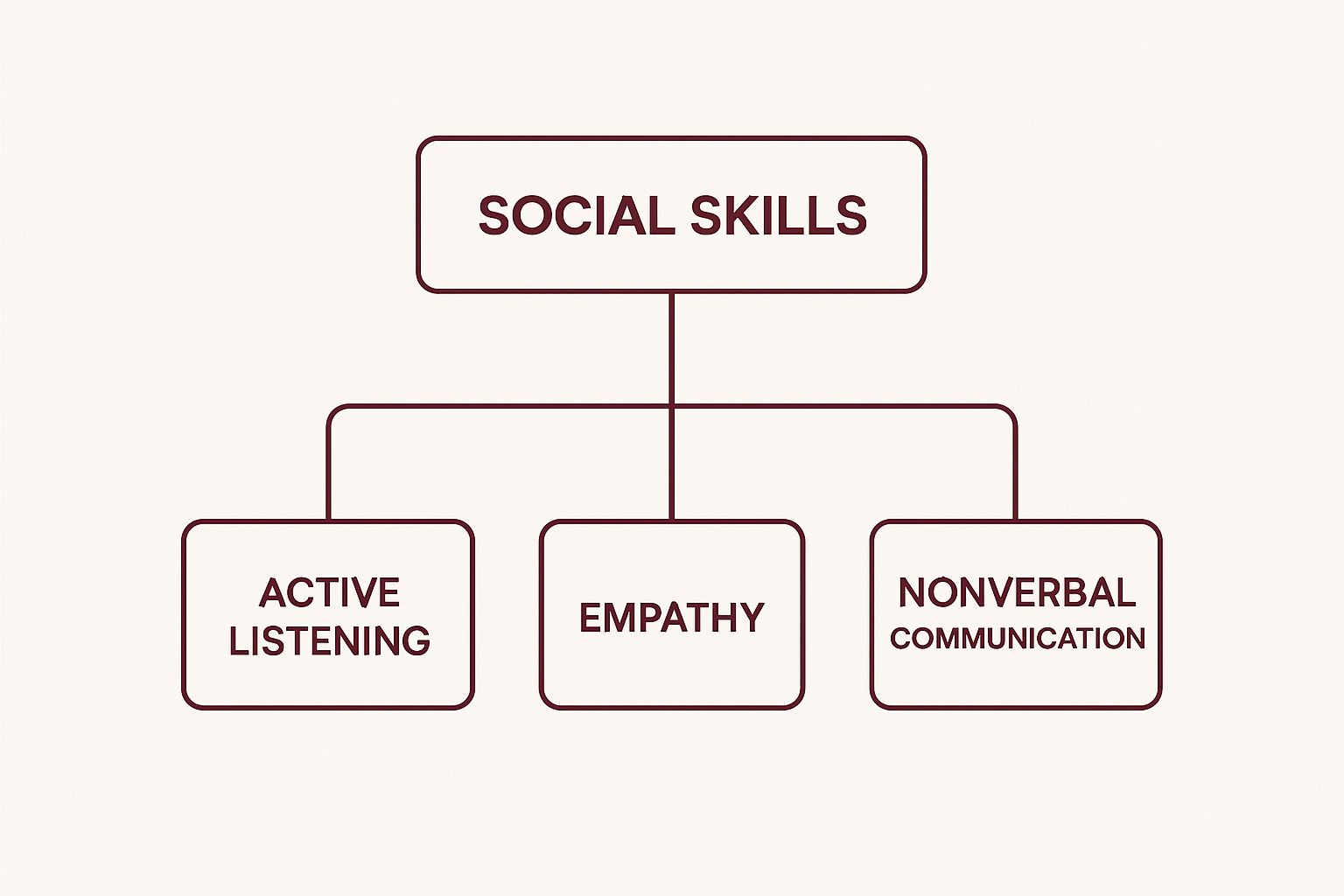Social skills coaching is a structured way to help adults improve communication, build genuine confidence, and strengthen their relationships, both at work and in their personal lives. It throws out the old idea that social grace is something you’re born with. Instead, it treats social abilities as what they are: skills that can be taught, practiced, and mastered with the right guidance.
Why Adult Social Skills Coaching Is on the Rise

Many of us grew up thinking that social skills were something you just absorbed as a kid. But in a world of remote work, endless digital chatter, and nuanced professional dynamics, that’s just not the full story anymore. The ability to truly connect with others has become a vital, and often underdeveloped, skill.
Think about it like learning an instrument. Some people might have a natural ear for music, but nobody becomes a master without practice, expert feedback, and a solid grasp of the fundamentals. Social skills coaching works the same way. It’s not about “fixing” a flaw; it’s about upgrading a crucial part of your toolkit for a more successful and connected life.
A Growing Need for Intentional Connection
The demand for this kind of coaching has exploded recently. The global coaching industry saw a massive 54% surge in practitioners between 2019 and 2023. By 2025, the market is expected to hit $5.34 billion. This isn't just a fleeting trend; it reflects a deep shift in how we approach our own development. You can dive deeper into the numbers in the full Global Coaching Study.
This isn't just about learning what to say. It's about building the confidence to navigate job interviews, lead team meetings, resolve conflicts, and form deeper personal relationships with less anxiety.
This focused, deliberate approach is a game-changer for so many people. It’s especially powerful for:
- Ambitious professionals aiming to sharpen their networking and leadership skills.
- Neurodivergent adults, including those with ADHD or Autism Spectrum Disorder (ASD), who thrive with structured, concrete strategies for navigating social situations.
- Anyone who feels their communication skills are the one thing holding them back from reaching their full potential.
Ultimately, seeking out social skills coaching is a proactive step. It's an investment in building a more confident, fulfilling, and connected life, both inside and outside the office.
What Social Skills Coaching Actually Involves
Forget the dry, clinical definitions. The best way to think about social skills coaching for adults is like having a personal trainer, but for your communication. It’s a practical, hands-on process designed to build up your social muscles, one conversation at a time.
A good coach doesn't just hand you a list of generic tips. Instead, they act as your strategist, helping you review the "game film" of your past social interactions. Together, you’ll start to see specific patterns that might be holding you back—like going quiet in group settings or misreading a coworker's tone.
This first step is all about understanding your unique social wiring without judgment. It’s how we create a personalized roadmap to build your confidence and competence.
Building Your Social Toolkit
Once you have a handle on the "what" and "why" behind your social patterns, the coaching shifts into targeted practice. This is where you actively build new habits through structured exercises. It's all about moving from theory to the real world, giving you practical tools you can start using right away.
This process usually focuses on three core pillars of interaction. As the diagram shows, essential abilities like listening, empathy, and nonverbal communication are the foundation for all strong social skills.
This visual makes it clear that being socially effective isn’t about mastering a single skill. It's about a combination of interconnected abilities that all support each other. When you strengthen one area, you naturally boost the others.
A huge part of this is helping individuals get comfortable with verbal interactions, especially by focusing on improving conversation skills. Your coach will guide you through specific techniques to make conversations feel less intimidating and more natural.
To really nail these skills, we've broken down what our coaching focuses on.
Core Components of Adult Social Skills Coaching
| Core Skill Area | What It Involves | Example Application |
|---|---|---|
| Verbal Communication | Learning to initiate, maintain, and gracefully end conversations. | Starting small talk with a coworker at the coffee machine instead of avoiding eye contact. |
| Nonverbal Communication | Understanding body language, facial expressions, and vocal tone (in yourself and others). | Noticing a friend's slumped shoulders and asking if everything is okay. |
| Active Listening | Paying full attention to what others are saying, rather than just waiting for your turn to talk. | Paraphrasing what someone said ("So, what you're saying is…") to show you're engaged. |
| Empathy & Perspective-Taking | Developing the ability to understand and share the feelings of another person. | Seeing a situation from your partner's point of view during a disagreement. |
| Assertiveness | Expressing your needs, thoughts, and feelings clearly and respectfully. | Politely declining a request you don't have the bandwidth for, without feeling guilty. |
| Conflict Resolution | Navigating disagreements in a constructive way that strengthens relationships. | Finding a compromise with a roommate about shared chores instead of letting resentment build. |
These components are the building blocks for feeling more capable and less anxious in any social setting.
Coaching provides a safe, supportive space to practice navigating high-stakes situations—like a job interview or a difficult conversation with a loved one—before you face them in real life.
From Practice To Performance
The final phase is all about taking what you've learned and using it in your day-to-day life. It’s not enough to practice in a controlled setting; the real goal is to feel confident using your new skills out in the wild. Your coach helps you set small, achievable goals for these real-world interactions.
This might look like:
- Mastering small talk: Learning how to start, sustain, and smoothly exit casual chats at parties or work events without feeling awkward.
- Reading non-verbal cues: Getting better at understanding body language and tone of voice so you can more accurately read the room.
- Practicing active listening: Using techniques that show you are truly engaged, which is the fastest way to build rapport and deepen connections.
This structured, step-by-step approach takes the guesswork out of social improvement. By breaking down complex interactions into manageable pieces, coaching gives you a clear and actionable path toward becoming a more effective and self-assured communicator. You're not just learning tricks; you're building a versatile skill set that will serve you everywhere.
Who Can Benefit from Social Skills Coaching?
It’s a common misconception that social skills coaching for adults is only for a certain “type” of person. The truth is, people from all walks of life find immense value in this kind of support, from driven professionals to those navigating the world with a different neurotype. It’s for anyone who feels a disconnect between the relationships they want and the ones they currently have.
Think of it like this: even a gifted athlete hires a coach to fine-tune their technique. In the same way, many successful people use social skills coaching to sharpen their most powerful tool—communication. It’s a structured way for anyone to build stronger, more genuine connections in every part of their life.
Ambitious Professionals Seeking an Edge
In the professional world, your technical skills will only get you so far. Real influence and leadership are built on a bedrock of strong interpersonal abilities. Many high-achievers turn to coaching to master these "soft skills," which often have the biggest impact on their career trajectory.
Coaching helps them:
- Build Leadership Presence: Learning to communicate with clarity and confidence is what inspires trust and gets teams motivated.
- Master Networking: When you can build genuine rapport in professional settings, you open doors to new opportunities and collaborations.
- Navigate Tough Conversations: Gaining the skills to handle conflict constructively is a non-negotiable for managing teams and client relationships.
For these individuals, coaching isn’t about fixing a flaw; it’s about adding a powerful layer of finesse to an already solid professional toolkit. It’s what separates someone who is good at their job from a leader people truly want to follow.
Social skills coaching provides the concrete strategies needed to translate technical expertise into real-world influence, helping professionals build the rapport necessary for career advancement.
Neurodivergent Adults Building Confidence
For neurodivergent adults, including those with ADHD or Autism Spectrum Disorder (ASD), the social world can sometimes feel like a game where the rules are unwritten and always changing. This is where tailored social skills coaching for adults can be a complete game-changer. It offers a clear, logical framework for interactions that might otherwise feel confusing or overwhelming.
Instead of relying on vague advice, coaching provides concrete, actionable strategies. For instance, it can break down complex social cues into understandable parts, offer scripts for common situations like small talk, and use role-playing to build confidence in a safe, supportive space. This structured approach helps bridge the gap between knowing what to do and feeling secure enough to actually do it.
This process is all about empowerment, not conformity. We focus on giving you the tools to navigate social situations with less anxiety and more of your authentic self. If you're interested in learning more about this specialized support, you can explore our detailed guide on social skills for autistic adults. Ultimately, coaching helps individuals feel more understood and better equipped to form the meaningful connections they deserve.
Proven Methods Used in Social Skills Training
Good social skills coaching for adults isn't about vague advice or a simple pat on the back. It’s built on a solid foundation of proven, evidence-based methods designed to create real, lasting change. These techniques give us a structured framework to break down complex social dynamics into parts that are much easier to understand and manage.
One of the most powerful tools in our kit is Cognitive Behavioral Therapy (CBT). Think of CBT as a way to untangle the knotted thoughts that fuel social anxiety. It helps you catch those automatic negative thoughts—like "Everyone thinks I'm awkward"—that can stop a conversation before it even starts. By learning to challenge and reframe these thoughts, you can walk into social situations with a calmer, more confident mindset.
Practicing in a Safe Environment
Another core method we use is structured role-playing. This isn't about awkward high school drama exercises; it's a practical way to rehearse high-stakes situations in a supportive, low-pressure environment. It’s like a batting cage for conversation. You get to practice handling a tricky negotiation at work, a first date, or a networking event without any of the real-world consequences.
This gives you the space to experiment with different approaches, get immediate feedback from your coach, and build muscle memory for what actually works. This kind of preparation is priceless for turning anxious uncertainty into confident action. Many of these skills overlap with the organizational strategies we teach in our guide on executive function coaching for adults, since both focus on building practical, real-world competence.
Breaking Down Complex Skills
For many people, especially neurodivergent individuals, social interactions can feel like trying to navigate a tidal wave of unspoken rules. This is where methods adapted from Applied Behavior Analysis (ABA) become incredibly useful. These strategies, which are increasingly being adapted for adults, break down complex social behaviors into teachable steps using methods like Discrete Trial Training (DTT).
This systematic training involves focused, repetitive exercises to teach foundational social behaviors such as eye contact and turn-taking, with continuous, individualized assessment to ensure goals evolve with the learner’s progress.
This approach takes an overwhelming concept like "active listening" and turns it into a series of clear, concrete actions you can practice one at a time. This methodical process removes the guesswork and gives you a clear path forward. You can learn more about how ABA is used for social skills on SilveiraBehavior.com.
By combining these science-backed techniques, social skills coaching moves beyond simple tips and offers a robust framework for genuine and sustainable improvement in how you connect with others.
The Transformative Outcomes of Improving Social Skills
What does success actually look like after finishing social skills coaching for adults? The results go way beyond just learning what to say. The entire process is designed to create deep, meaningful changes in your confidence, your relationships, and your overall quality of life.
Imagine walking into a room full of people and feeling curiosity instead of that familiar knot of dread. One of the first things people notice is a huge drop in their social anxiety. When you have a toolkit of reliable strategies for starting conversations, reading a room, and actually connecting with people, the fear of the unknown starts to melt away.
This new sense of ease makes every interaction—from casual chats to important meetings—feel less draining and more enjoyable.
Professional and Personal Growth
In a professional setting, strong social skills can be a career game-changer. They give you the tools to nail presentations, build the rapport you need to lead a team, and network with genuine confidence. It’s often the difference between being a capable employee and becoming an influential leader people are excited to work with.
These skills translate directly into better opportunities, whether that means a promotion or starting a new venture entirely.
On a personal level, the impact is just as profound. Better communication can help mend strained family dynamics and turn casual acquaintances into close, supportive friends. When you can express your needs clearly and listen with real empathy, you build the kind of deep relationships that are essential for a fulfilling life.
Evidence shows that structured social skills programs are highly effective. For example, some studies reveal that approximately 74% of participants with social anxiety no longer meet the diagnostic criteria after intervention.
A New Sense of Self
Ultimately, investing in your social skills is an investment in yourself. As your abilities grow, so does your self-esteem. You start to see yourself as someone who is capable, connected, and in control of your social destiny. The goal is to help you learn how to boost self-confidence and transform your life and engage more fully with the world around you.
This journey is about so much more than just mastering small talk. It’s about building a more connected, confident, and satisfying life, one interaction at a time. The outcomes aren’t just noticeable; they are life-changing.
How to Get Started with Social Skills Coaching
So, you’ve decided to explore social skills coaching. That’s a huge first step. But what comes next? Where do you even begin?
Let's walk through the process and take the guesswork out of it. The most important thing is finding the right kind of support that actually matches what you’re trying to achieve.
Your first move is to find a qualified coach. Look for someone with a background in psychology, counseling, or coaching—but more importantly, someone with real-world experience in social skills coaching for adults. If you're neurodivergent, it's even more critical to find a specialist who gets the nuances of ADHD or ASD. You don't want generic advice; you need strategies that work for your brain. A good coach is a guide, someone who sits down with you to set realistic goals from the very first meeting.
Finding the Right Program Format
As you start looking, you’ll see that coaching comes in a few different flavors. Each has its own perks, and the best one for you really boils down to your comfort level, how you learn best, and what you want to get out of it.
Think about these different setups:
- One-on-One Sessions: This is a deeply personalized approach. You get to focus on your specific hurdles in a private, confidential setting, making it perfect for targeted work.
- Group Workshops: Being in a group gives you a safe space to practice new skills with other people who get it. It’s a fantastic way to feel less alone on this journey.
- Virtual Coaching (Telehealth): Online sessions are all about flexibility. You can get expert guidance right from your own home, which is a game-changer for busy schedules.
Lots of people find that a group setting offers the perfect mix of professional guidance and practice with peers. Here at the Sachs Center, we’ve seen amazing growth from participants in our group programs. You can learn more about our social skills groups for adults to see if that kind of environment feels right for you.
The initial assessment isn't a test; it's a collaborative conversation. It's a chance for you and your coach to map out what success looks like for you, ensuring the program is perfectly aligned with your personal and professional aspirations.
By taking the time to check out your options and choose a format that fits, you can take that next step with confidence, ready to build stronger, more meaningful connections.
Got Questions? We've Got Answers
Stepping into the world of social skills coaching for adults often brings up a few questions. It’s a big step, after all. Here are some clear, straightforward answers to the things we get asked most often, so you know exactly what to expect.
How Long Does Coaching Take to Show Results?
Everyone’s journey is different, but many people start feeling a real shift in their confidence within the first few weeks. A typical coaching program runs somewhere between three and six months, with regular sessions to keep the momentum going.
But the real magic happens outside of our sessions. The key to making these changes stick is practicing the skills in your day-to-day life. Over time, what starts as a conscious effort becomes second nature—a natural, confident way of connecting with the world.
Is Social Skills Coaching Covered by Insurance?
This is a great question, and the answer really depends on the provider and the specific context. If a licensed therapist is providing the coaching as part of a larger treatment plan for a diagnosed condition—like Social Anxiety Disorder, ADHD, or ASD—your insurance plan might cover it.
However, if the coaching is provided by someone who isn't a licensed therapist, it’s usually not covered.
Your best bet is always to check directly with your insurance provider. They can give you the clearest picture of your benefits. Many centers, including ours, also offer flexible payment options to make sure our services are accessible.
What Is the Difference Between Therapy and Coaching?
While therapy and coaching sometimes feel similar, they have fundamentally different goals. Therapy often looks back, exploring past experiences and emotional history to understand the why behind your challenges. It's focused on healing and treating clinical conditions.
Coaching, on the other hand, is forward-looking and all about action. The focus is squarely on building practical, real-world skills for specific situations. We teach you the how—how to navigate conversations, how to build connections, how to handle tricky social moments.
Think of it this way: therapy helps you heal, while coaching helps you build. Both are incredibly powerful tools for growth, just from different angles.
Here at the Sachs Center, we specialize in guiding adults just like you toward better social skills and more meaningful connections. If you're ready to build that confidence, we're ready to help. Explore our services and book an appointment today.


